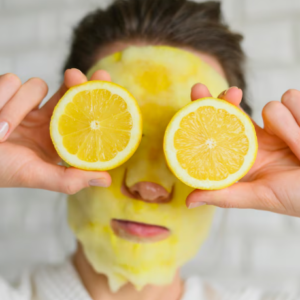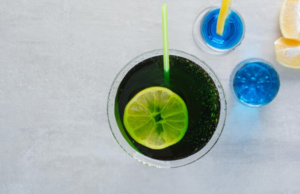Dark spots on the skin are areas that appear darker than the surrounding skin due to an increase in melanin production. People often seek ways to lighten or remove these spots, and one common suggestion is using lemon juice. Lemon juice is believed to have properties that can help fade dark spots and even out skin tone. Many people find this appealing because lemon juice is natural and readily available at home
Table of Contents
The Allure of Lemon Juice for Dark Spots:
Appeal of Natural Remedies
People are drawn to natural remedies like lemon juice because they believe they are safer and more gentle on the skin compared to harsh chemicals. Lemon juice is a common household item, making it convenient for those looking for a quick fix for their dark spots. Its acidity, attributed to citric acid, is thought to contribute to its skin-lightening properties.
Citric Acid in Lemon Juice: How Does It Work?
Lemon juice contains citric acid, which is a natural bleaching agent. This acid can help lighten dark spots by exfoliating the skin and inhibiting melanin production. Melanin is the pigment responsible for the color of our skin, and excessive production can lead to dark spots. By reducing melanin production, lemon juice may help fade these spots over time.
Accessibility and Affordability: Advantages of Lemon Juice
One of the key advantages of using lemon juice for dark spots is its accessibility and affordability. Unlike specialized skincare products, lemon juice is readily available in most households and is relatively inexpensive. This makes it an attractive option for those looking for a budget-friendly solution to their skin concerns.
Potential Pitfalls of Using Lemon Juice

Harsh Effects on Skin: Irritation and Dryness
While lemon juice may offer benefits for some individuals, it can also cause adverse reactions in others. Lemon juice is highly acidic, and applying it directly to the skin can lead to irritation, redness, dryness, and even burning sensations. Individuals with sensitive skin are particularly susceptible to these side effects
Sun Sensitivity: Risk of Sunburn and Dark Spot Worsening:
Another drawback of using lemon juice is its potential to increase skin sensitivity to sunlight. This can make the skin more prone to sunburn and may worsen existing dark spots. It’s essential to use sunscreen diligently when using lemon juice on the skin to minimize the risk of sun damage
Inconsistent Results: Patchy Skin Tone
Some individuals may experience uneven results when using lemon juice to lighten dark spots. Lemon juice may lighten some areas more than others, leading to a patchy or uneven skin tone. This inconsistency can be frustrating for individuals seeking uniform skin lightening
Safer Alternatives for Brighter Skin:
Introduction to Gentler Natural Ingredients
Fortunately, there are gentler alternatives to lemon juice for addressing dark spots. These natural ingredients offer similar benefits without the harsh side effects associated with lemon juice.
Kojic Acid: A Mild Lightening Agent
Kojic acid derived from mushrooms, is known for its mild lightening effect on the skin. It can help fade dark spots without causing irritation, making it suitable for individuals with sensitive skin.
Licorice Root Extract: Known for Brightening Properties
Licorice root extract is another natural ingredient renowned for its brightening properties. It can help even out skin tone and reduce the appearance of dark spots without causing dryness or irritation.
Vitamin C: Powerful Antioxidant for Hyperpigmentation
Vitamin C is a potent antioxidant that can help reduce hyperpigmentation and promote a more radiant complexion. It works by inhibiting melanin production and brightening the skin tone over time.
Building a Skincare Routine for Dark Spots:
Importance of Consistency in Skincare:
Consistency is key when it comes to addressing dark spots. Establishing a regular skincare routine can help maximize the effectiveness of natural ingredients and promote overall skin health.
Steps for an Effective Skincare Routine:
A typical skincare routine for dark spots may include gentle cleansing, targeted treatment with natural ingredients, moisturizing to hydrate the skin, and sun protection to prevent further darkening of spots.
Sun Protection: Essential for Dark Spot Prevention:
Sunscreen is crucial for protecting the skin from harmful UV rays, which can exacerbate existing dark spots and cause further pigmentation issues. Using a broad-spectrum sunscreen with SPF 30 or higher is recommended for adequate protection.
Seeking Professional Guidance:

When to Consult a Dermatologist:
If dark spots persist or worsen despite using natural remedies, it may be time to consult a dermatologist. Dermatologists can provide personalized treatment options tailored to individual skin concerns.
Professional Treatment Options: Chemical Peels, Microdermabrasion, Laser Therapy:
Professional treatments such as chemical peels, microdermabrasion, and laser therapy can effectively target dark spots and promote skin renewal. These treatments are performed under the supervision of a dermatologist and can yield significant improvements in skin tone and texture.
Patience and Persistence for Lasting Results:
Timeframe for Dark Spot Improvement:
Achieving noticeable results with natural remedies and skincare routines may take time and patience. Consistent use of gentle ingredients and adherence to sun protection measures can gradually fade dark spots over several weeks or months.
The Role of Consistency in Skincare Routine:
Consistency is essential for maintaining the efficacy of skincare products and treatments. Regular application of natural ingredients and adherence to a skincare routine can help sustain improvements and prevent the recurrence of dark spots.
Preventing Future Dark Spots:
Importance of Sun Protection
Minimizing sun exposure and wearing sunscreen daily are crucial for preventing the formation of new dark spots. Sun protection helps shield the skin from UV damage and reduces the risk of hyperpigmentation.
Healthy Habits for Skin Health: Diet and Stress Management
Maintaining a healthy lifestyle with a balanced diet rich in fruits, vegetables, and whole grains can support skin health from within. Additionally, managing stress through relaxation techniques like yoga or meditation can help prevent skin problems associated with chronic stress.
Embracing a Holistic Approach to Beauty
True beauty encompasses more than just external appearance. Embracing a holistic approach to beauty involves prioritizing self-care, adopting healthy habits, and nurturing overall well-being. By focusing on both inner and outer aspects of health, individuals can achieve a radiant complexion and enhanced overall quality of life.
Conclusion:
While lemon juice may offer some benefits for lightening dark spots, it also poses risks of skin irritation, sun sensitivity, and inconsistent results. There are safer and more effective alternatives, such as kojic acid, licorice root extract, and Vitamin C, which can address dark spots without causing harm to the skin. Establish
